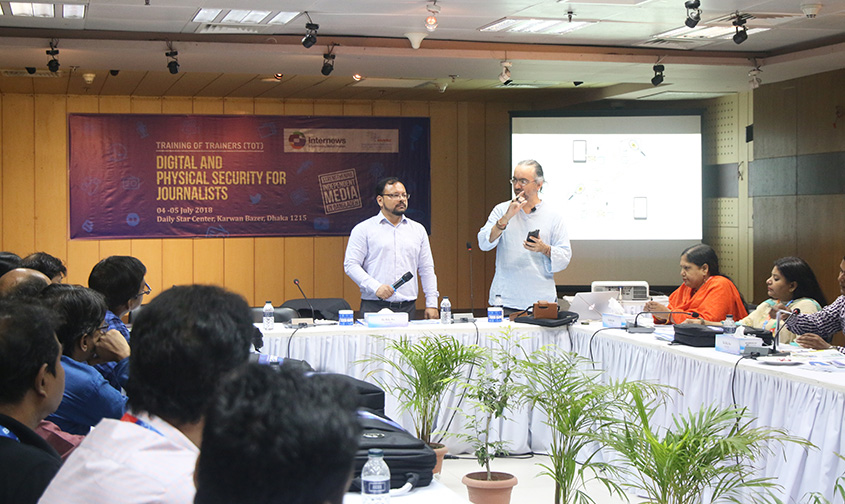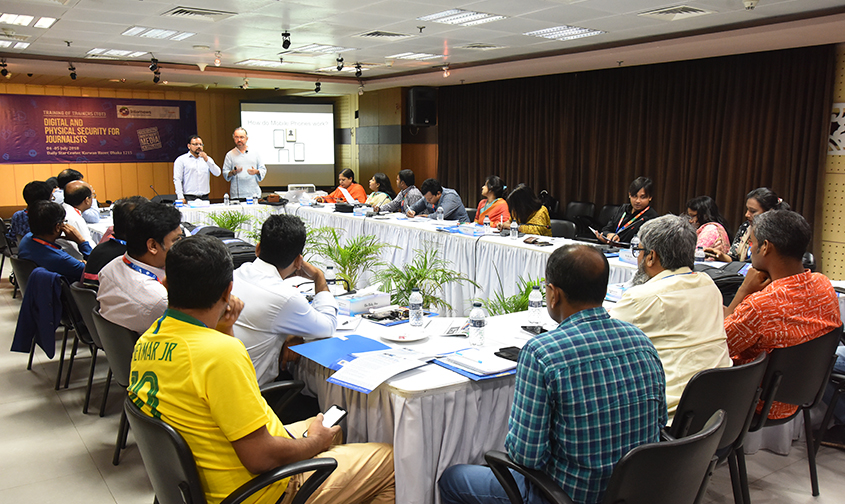

Title: Strengthening Independent Media in Bangladesh
Program Period: November 2017-May 2019
Budget: 50,61,326 BDT
Background Information:
The Media Sector in Bangladesh has grown considerably over the last 15 years. There are now 44 Television Channel, 28 FM, 32 Community Radio, 1187 Daily Newspaper and more than 100 Online News Portals have been approved by Ministry of Information in Bangladesh. Despite this vibrant market, Professional and Citizen journalist in our country are experiencing unprecedented levels of pressure and physical threats meant to stifle independent voice. Violence against journalists by religious extremist and threat is increasing significantly. Besides prosecution by politicians and the courts also censoring the freedom of expression.
Journalist safety and impunity: A 2014 Article report on Freedom of Expression in Bangladesh, recorded and an alarming 106% increase from 2013 in harassment figures against journalists -with a single conviction. This trend of violence has become increasingly deadly. In 2015, four bloggers were gruesomely murdered within six months, this wave of violence and lack of adequate official response has put Bangladesh to 12th position of out 14 ranked by Committee to Protect Journalists Global Impunity. The report condemning Bangladesh’s position in its index, identifies spotlight countries like Bangladesh where they said ‘killers go free’.
Compounding this increasingly hostile operational environment is a sector influenced by corporate ownership and political allegiances. This has resulted in increasing self-censored at the individual journalist and editorial levels.
At the same time, digital threats are increasing too, with journalists using technology without basic safeguards. In the digital era journalists handle sensitive information and the devices that contain them on a daily basis. They depend on the Internet and digital communications for research on stories, interaction with audiences and sources as well as for news distribution. So, if a journalist loses access to sensitive information related to an assignment, he or she will not be able to do the story. If someone gains unauthorized access to that information, it might put the journalist and his source at risk. Even the journalist’s personal information (such as email or phone sms) is exposed, that might jeopardize his or her physical safety.
A recent study found a third of journalists never encrypt their emails or use two-factor verification for their email or social media accounts, and two-third of journalists do not lock their smartphone with any passcode.
Despite these Challenges Bangladeshi Media and civil society have demonstrated, through coalition building and advocacy around the Right to Information (RTI) Act, that government can successfully be engaged on issues related to freedom of speech and information. And, by adopting the array of available cutting edge digital and physical security tools and approaches, professional journalists and bloggers can be empowered to prevent and mitigate threats, giving them the space and confidence, they need to work with.
Considering this situation, Bangladesh NGOs Network for Radio Communication (BNNRC) have been implementing a program titled ‘Strengthening Independent Media in Bangladesh with support from Internews on digital & physical security in order to help journalists better protect themselves and their data, and to carry out their work with greater freedom.
Overall Goal:
The goal is to foster media independence in Bangladesh by strengthening investigative journalism capacity, building skills in digital and physical security, reducing self -censorship and addressing lack of media freedoms.
Objectives of the Program:
Increase digital and physical security of journalists, bloggers and other media professionals who cover accountability, democratic governance, religion and/or secularism.
Activities:
- Risk Assessment: Conduct/Design a pre-training assessment survey to find out key perceived digital and physical safety risks faced by participants/Journalist.
- Module Development/ Curriculum and training Design: Develop a training curriculum appropriate for Bangladeshi professional and Citizen Journalists .
- Training of Trainers (ToT): Two ToT events- one to instruct trainers in security practices and teaching methodology and one at program end to collect graduate feedback will be held.
- Digital and Physical Security Training: A total of 10 training sessions will be delivered. Each one of the four Investigative Reporting Bootcamps planned in Dhaka, Chottogram, Rajshahi and Jessore will have one day allocated for safety training. In addition, three stand-alone safety training will be organized-one targeting bloggers and another two catering to female journalists/bloggers.
- Publish a Booklet: Publish a booklet on journalist digital and physical security in Bangla.
Expected Result of the Program:
- Local cadre of digital and physical security trainers strengthened and networked.
- Cohort of geographically diverse Bangladeshi journalists would have the skills to produce objective, unbiased, high quality in-depth reporting and investigations.
- Journalist and bloggers would be able to conduct their work more securely and safely.
- Digital and physical security curriculum and tools would be localized in Bangla & English.
- Media-NGO coalition to address self-censorship and media freedoms initiated.
Contact-
Mr. Naimul Haq
Consultant
Cell: 0191-219-6867
Email: naim68@gmail.com
Protiva Banerjee
Program Officer
Cell: 01814847780
Email: protiva@bnnrc.net


